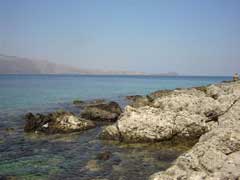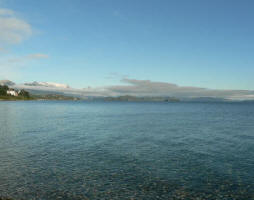 UNICEF, WHO Release New Global Statistics on Water and Sanitation
UNICEF, WHO Release New Global Statistics on Water and Sanitation
Every day, over 2.5 billion people suffer from a lack of access to improved sanitation and nearly 1.2 billion practice open defecation, the riskiest sanitary practice of all, according to a report issued by the WHO/UNICEF Joint Monitoring Programme for Drinking-water Supply and Sanitation (JMP), a Water and Sanitation Program partner.
The JMP report, titled "Progress on Drinking Water and Sanitation - Special Focus on Sanitation," comes halfway through the International Year of Sanitation. The report assesses -- for the first time ever -- global, regional and country progress using an innovative "ladder" concept. This shows sanitation practices in greater detail, enabling experts to highlight trends in using improved, shared and unimproved sanitation facilities and the trend in open defecation. Similarly, the 'drinking water ladder' shows the percentage of the world population that uses water piped into a dwelling, plot or yard; other improved water sources such as hand pumps, and unimproved sources.
The number of people globally who lack access to an improved drinking water source has fallen below one billion for the first time since data were first compiled in 1990. At present 87 per cent of the world population has access to improved drinking water sources, with current trends suggesting that more than 90 per cent will do so by 2015.
The number of people worldwide practicing open defecation dropped from 24 per cent in 1990 to 18 per cent in 2006. The report also highlights disparities within national borders, particularly between rural and urban dwellers. Worldwide, there are four times as many people in rural areas – approximately 746 million – without improved water sources, compared to some 137 million urban dwellers.
Poor sanitation threatens children's survival as a fecally-contaminated environment is directly linked to diarrheal disease, one of the biggest killers of infants under the age of five. A clean environment is very difficult to ensure if open defecation is practiced, even by a minority of the population.
“At current trends, the world will fall short of the Millennium sanitation target by more than 700 million people,” said Ann M. Veneman, UNICEF Executive Director. “Without dramatic improvements, much will be lost.”
However, more and more people are now using improved sanitation facilities - that is, facilities that ensure human excreta are disposed of in a way that prevents them from causing disease by contaminating food and water sources. Though the practice of open defecation is on the decline worldwide, 18 per cent of the world's population, totaling 1.2 billion people, still practice it. In southern Asia, some 778 million people still rely on this riskiest sanitation practice.
"We have today a full menu of low-cost technical options for the provision of sanitation in most settings" says Dr Margaret Chan, WHO's Director-General. "More and more governments are determined to improve health by bringing water and sanitation to their poorest populations. If we want to break the stranglehold of poverty, and reap the multiple benefits for health, we must address water and sanitation."
Real improvements in access to safe drinking water have occurred in many of the countries of southern Africa. According to the report, seven of the ten countries that have made the most rapid progress and are on track to meet the Millennium Development Goal drinking water targets are in sub-Saharan Africa (Burkina Faso, Namibia, Ghana, Malawi, Uganda, Mali, Djibouti). Of the countries not yet on track to meet the sanitation target, but making rapid progress, five are in sub-Saharan Africa (Benin, Cameroon, Comoros, Mali and Zambia).
About UNICEF: UNICEF is on the ground in over 150 countries and territories to help children survive and thrive, from early childhood through adolescence. The world’s largest provider of vaccines for developing countries, UNICEF supports child health and nutrition, good water and sanitation, quality basic education for all boys and girls, and the protection of children from violence, exploitation, and AIDS. UNICEF is funded entirely by the voluntary contributions of individuals, businesses, foundations and governments.
About WHO: WHO is the directing and coordinating authority for health within the United Nations system. It is responsible for providing leadership on global health matters, shaping the health research agenda, setting norms and standards, articulating evidence-based policy options, providing technical support to countries and monitoring and assessing health trends. WHO has recognized the importance of water and sanitation from its inception.
About JMP: The WHO/UNICEF Joint Monitoring Programme for Water Supply and Sanitation is the official UN mechanism tasked with monitoring progress towards MDG Target 7c on drinking water supply and sanitation.
About WSP: The Water and Sanitation Program is a multi-donor partnership of The World Bank. Our mission is to alleviate poverty by helping poor people gain sustained access to improved water and sanitation services. We work directly with governments at the local and national level in 27 countries through four regional offices and in the World Bank headquarters in Washington D.C.
The report will be available on the JMP website www.wssinfo.org
and from WHO web-site at www.who.int/water_sanitation_health
.
All press releases, fact sheets and other WHO media material may be found at www.who.int.
Attn: Broadcasters: B-roll on Water and Sanitation issues will be available on www.thenewsmarket.com/unicef
For further information, please contact:
Kate Donovan, UNICEF Media, New York, Tel; 212 326 7452 e-mail: kdonovan@unicef.org .
Ms. Sari SETIOGI, Media Relations Officer, Health Security and Environment, Ph. + 41 22 791 3576, Mobile +41 79 701 9467 e-mail: setiogis@who.int
Ms. Nada Osseiran, Advocacy & Communications Officer, Public Health and Environment, WHO, Geneva, Tel. +4122 - 7914475, Mobile +4179 445 1624, Email: osseirann@who.int.
| Contact information |
WSP
(email: wsp@worldbank.org) |
|---|---|
| News type | Inbrief |
| File link | n/a |
| Source of information | WSP |
| Keyword(s) | MDGs |
| Subject(s) | DRINKING WATER AND SANITATION : COMMON PROCESSES OF PURIFICATION AND TREATMENT , METHTODOLOGY - STATISTICS - DECISION AID , SANITATION -STRICT PURIFICATION PROCESSES |
| Relation | http://www.semide.net/initiatives/map/MSSD/doc343246 |
| Geographical coverage | International |
| News date | 21/07/2008 |
| Working language(s) | ENGLISH |
 you are not logged in
you are not logged in





